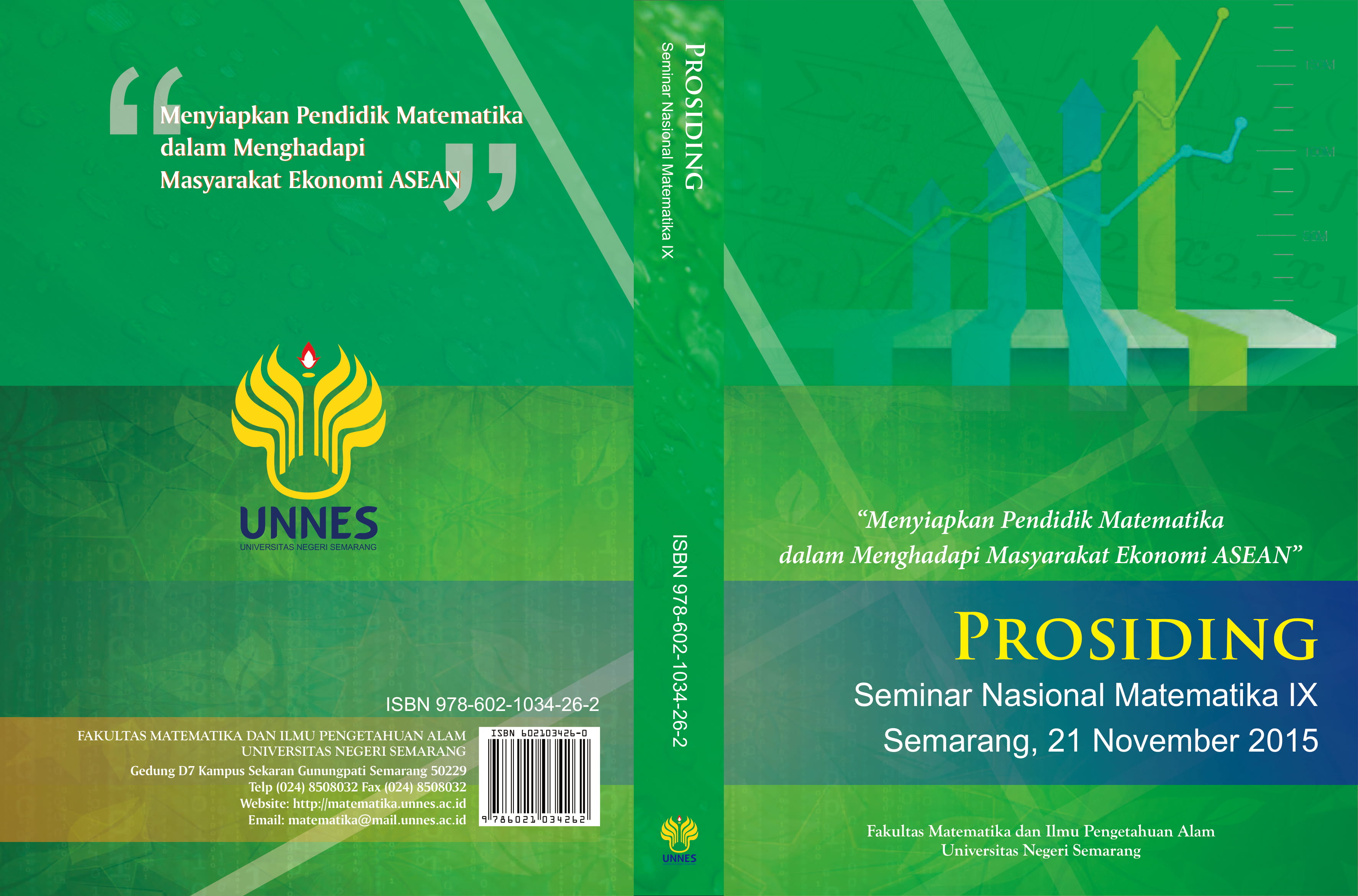LKM “Mailing Merge†Media Latih Literasi Matematika Pada Pembelajaran Inkuiri di SMK
Main Article Content
Abstract
Artikel konseptual ini bertujuan untuk menggambarkan bagaimana mengoptimalkan aplikasi Mailing Merge dalam pembuatan Lembar Kerja Mandiri sebagai media melatih kemampuan literasi matematika dalam pembelajaran inkuiri di SMK. Gagasan konseptual ini dilandasi dari kondisi riil berdasarkan pengisian kuesioner oleh siswa kelas XI Produksi Grafika SMK Negeri 11 Semarang menunjukkan bahwa kemandirian belajar siswa tergolong rendah, sebanyak 32% siswa cenderung melihat hasil pekerjaan teman dan 48% hanya mengerjakan soal-soal yang mudah dan sisa soal lainnya mengandalkan temannya yang dianggap mampu. Tanggapan siswa menunjukkan bahwa soal-soal yang diberikan tidak berbeda satu sama lain sehingga berpotensi bagi siswa dengan kesadaran metakognitif rendah cenderung mencontek pekerjaan temannya. Aplikasi “Mailing Merge†merupakan sebuah solusi membantu guru dalam membuat Lembar Kerja Mandiri dengan karakteristik berbeda satu sama lainnnya sebagai media melatih kemampuan literasi matematika dalam pembelajaran inkuiri.
Article Details
References
Anggo, M. 2011. “Pelibatan Metakognisi dalam Pemecahan Masalah Matematikaâ€. Edumatica. Volume 1: 25-32.
Aoyama, K. & Stephens, K. 2003. “Graph Interpretation Aspects of Statistical Literacy: A Japanese Perspectiveâ€. Mathematics Education Research Journal. Vol. 15, No. 3, 207-225
Buckner, E. 2013. “Integrating technology and pedagogy for inquiry-based learning: The Stanford Mobile Inquiry-based Learning Environment (SMILE)â€. Prospects. DOI 10.1007/s11125-013-9269-7.
Chapman, O. 2013. “Mathematics Teachers’ Learning Through Inquiryâ€. Journal Of Education. Volume 1, ISSUE 3,PP. 122-150.
¬Chick, H.& Pierce, R. 2012. “Teaching for Statistical Literacy: Utilising Affordances in Real-world Dataâ€. International Journal of Science and Mathematics Education . Vol 10 339-362.
Chin, K. E. 2013. “Making Sense of Mathematics: Supportive and Problematic Conceptions with special reference to Trigonometryâ€. Desertation. The University of Warwick.
Dai, D.Y., at.al. 2011. “Inquiry-Based Learning in China: Do Teachers Practice What They Preach, and Why?â€. Front. Educ China. Vol 6(1): 139–157
Goos, M. 2004. “Learning Mathematics in a Classroom Community of Inquiryâ€. Journal for Research in Mathematics Education. Vol. 35, No. 4, 258-291
Hamdani. 2014. Strategi Belajar Mengajar. Bandung: Pustaka Setia.
Johar, R. 2012. “Domain Soal PISA untuk Literasi Matematikaâ€. Jurnal Peluang. Volume: 1. Hal : 30-41.
Justice, C. 2009. “ Inquiry-based learning in higher education: administrators’ perspectives on integrating inquiry pedagogy into the curriculumâ€. High Educ. Vol 58:841–855
Litmanen, T., at.al. 2012. “Capturing teacher students’ emotional experiences in context: does inquiry-based learning make a difference?â€. Instr Sci. Vol 40:1083–1101
Maaß, K. & Artique, M. 2013. “Implementation of inquiry-based learning in day-to-day teaching:a synthesisâ€. ZDM Mathematics Education. Vol: 45:779–795
Menezes, L.A.P., at.al. 2012. “Teacher Practice in an Inquiry-Based Mathematics Classroomâ€. Hellenic Mathematical Society.International Journal for Mathematics in Education.Vol 4.357-362.
OECD. 2013. PISA 2012 Assessment and Analytical Framework Mathematics, Reading, Science, Problem Solving and Financial Literacy. PISA. OECD Publishing
OECD. 2013. PISA 2012 Results: What Students Know and Can Do Student Performance in Mathematics, Reading and Science (Volume 1). PISA, OECD Publishing.
Roehrig, G.H., at.al. 2011. “We Look More, Listen More, Notice More: Impact of Sustained Professional Development on Head Start Teachers’ Inquiry-Based and Culturally-Relevant Science Teaching Practicesâ€. J Sci Educ Technol Vol 20:566–578
Rooney, C. 2012. “How am I Using Inquiry-Based Learningto Improve my Practice and To Encourage Higher Order Thinking Among My Students of Mathematics?â€. Educational Journal of Living Theories: Volume 5(2): 99-127.
Rusmining. dkk. 2014. “Analysis Of Mathematics Literacy, Learning Constructivism And Character Education (Case Studies on XI Class of SMK Roudlotus Saidiyyah Semarang, Indonesia)â€. International Journal of Education and Research. Volume: 2: 331-340.
Siberman, M. 1998. Active Training. San Fransisco: Josey-Bass.
Sikko, S.A.,at.al. 2011. “Working with Mathematics and Science teachers on inquiry based learning (IBL) approaches: Teacher beliefsâ€. Acta Didactica Norge. Vol 6: 1-17.
Song, Y & Looi, C. 2012. “Linking teacher beliefs, practices and student inquiry-based learning in a CSCL environment: A tale of two teachersâ€. International Society of the Learning Sciences. Computer-Supported Collaborative Learning. Vol: 7:129–159
Stacey, K. 2010. “Mathematical and Scientific Literacy Around The Worldâ€. Journal of Science and Mathematics Education in Southeast Asia. Vol. 33 No. 1, 1-16
Suherman, E., dkk. 2004. Strategi Pembelajaran Matematika Kontemporer. Bandung: UPI.
Suriyon, A. at.al. 2013. “Students’ Metacognitive Strategies in the Mathematics Classroom Using Open Approachâ€. Scientific Reshearch.Vol.4, No.7, 585-591
Turmudi, 2008. Landasan Filsafat dan Teori Pembelajaran Matematika (Paradigma Eksploratif dan Investigatif). Jakarta: Leuser Cita Pustaka.
Wardhani, S. & Rumiyati. 2011. Instrumen Penilaian Hasil Belajar Matematika SMP: Belajar dari PISA dan TIMSS.Yogyakarta: P4TK.
Yang, K. 2015. “The Effects of PISA in Taiwan: Contemporary Assessment Reformâ€. Assessing Mathematical Literacy. DOI 10.1007/978-3-319-10121-7_14.
Yoong, W. 2013. “Metacognitive Reeflection at Secondary Levelâ€. Nurturing Reflective Learning in Mathematics.Yearbook 2013 Association of Mathematics Educator. Word Scientific Publishing. CO. Pre.Ltd.
Yore, L.D, et al. 2007. “The Literacy Component of Mathematical and Scientific Literacyâ€. International Journal of Science and Mathematics Education. Vol 5: 559-589.
Young, A. 2010. “Explorations of Metacognition Among Academically Talented Middle and High School Mathematics Studentsâ€.Dissertation. UC Berkeley Electronic Theses and Dissertations
Zeverbergen, at.al. 2004. Teaching Mathematics in Primary Schoools. Australia: Allen & Unwin.
